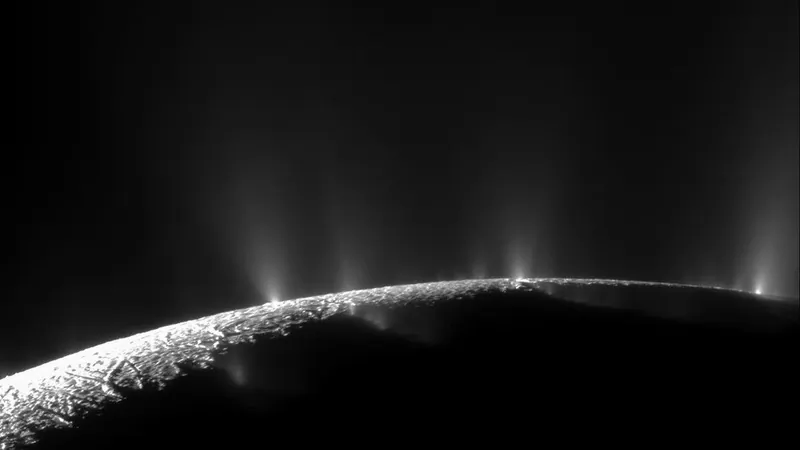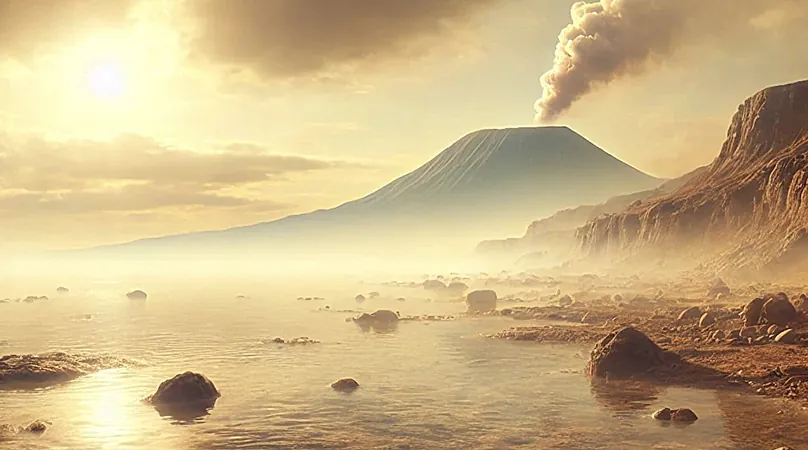
Mysterious Dark Spot Vanishes on Saturn's Enceladus: What Could It Mean for Life Beyond Earth?
2024-12-15
Author: William
Introduction
Saturn, known as the "mooniest" planet in our solar system, is home to an impressive 146 moons, far surpassing its celestial neighbors. While explorers often look towards planets like Jupiter and Neptune with their many moons, it is Saturn’s moon, Enceladus, that has captured the attention of scientists in their quest to discover extraterrestrial life.
Enceladus: A Jewel of Planetary Exploration
Enceladus is considered a jewel of planetary exploration due to its subsurface ocean, which scientists believe may host the essential ingredients for life. The confirmed presence of massive plumes of icy water vapor blasting from its surface suggests that there might be organics or other life-sustaining molecules contained within that ocean. Each discovery on this enigmatic moon raises more questions, offering tantalizing potential for what lies beneath its icy crust.
The Disappearance of the Dark Spot
Recent studies presented at the 2024 American Geophysical Union meeting brought focus to an unsettling phenomenon: a bizarre, disappearing dark spot observed on the surface of Enceladus. As researchers delve into this anomaly, they hope to decode its significance and understand more about the geological activities on the moon.
Investigating the Anomaly
Cynthia B. Phillips, a planetary geologist at NASA's Jet Propulsion Laboratory, shed light on the peculiar spot during her presentation. The investigation began when her colleague Leah Sacks discovered the dark spot in a mosaic of images captured by NASA's Voyager and Cassini missions. Phillips recounted, “After analyzing images from different years, we found that a spot approximately one kilometer across had seemingly faded away between 2009 and 2012.”
Analysis of the Dark Spot
This gradual disappearance is particularly intriguing, given that Enceladus possesses high “albedo,” making it predominantly bright. The unusual sight of a dark spot—one that was reducing in prominence over time—defied expectations, prompting the team to investigate further to rule out other possibilities.
Hypotheses and Speculation
If scientific visuals offer clues, Phillips hypothesized potential causes, suggesting, “It could be a crater filled with darker material or something unique emanating from the interior.” Speculation built around the possibility that this striking color might even hint at core compositions not yet observed.
Yet, there’s a more groundbreaking explanation that could signal an exciting avenue for exploration: the dark spot might be indicative of the icy plumes that saturate Enceladus’s surface. Phillips elaborated, suggesting that the plumes may have deposited layers of ice over the spot, causing it to vanish from view. However, this raises questions: Could such a rapid deposition occur over a few years, given existing models estimate a much longer timescale for significant changes?
Implications for Understanding Enceladus
One tantalizing possibility is that particles from Saturn’s E ring, a collection of icy grains, could be contributing to the reshaping of the moon's surface, adding complexity to our understanding of Enceladus’s geologic processes.
Conclusion
Despite the compelling theories, many questions linger. Could there be additional mechanisms at play in the snow-covered realms of Enceladus? What would it mean for the conditions underlying the existence of life if the material from beneath the surface is indeed rising through geological activity?
With each new discovery on Enceladus, insights gained could unlock answers about the potential for life beyond Earth as well as the processes that govern icy worlds. This dark spot has become more than just a scientific curiosity; it’s a call to researchers, urging them to look beyond our world and consider the possibilities that lie in the shadows of distant moons. The mystery of Enceladus grows ever more fascinating, and as further studies unfold, the dialogue surrounding our cosmic neighborhood will only escalate. Keep your eyes on the stars—who knows what revelations await?









 Brasil (PT)
Brasil (PT)
 Canada (EN)
Canada (EN)
 Chile (ES)
Chile (ES)
 España (ES)
España (ES)
 France (FR)
France (FR)
 Hong Kong (EN)
Hong Kong (EN)
 Italia (IT)
Italia (IT)
 日本 (JA)
日本 (JA)
 Magyarország (HU)
Magyarország (HU)
 Norge (NO)
Norge (NO)
 Polska (PL)
Polska (PL)
 Schweiz (DE)
Schweiz (DE)
 Singapore (EN)
Singapore (EN)
 Sverige (SV)
Sverige (SV)
 Suomi (FI)
Suomi (FI)
 Türkiye (TR)
Türkiye (TR)